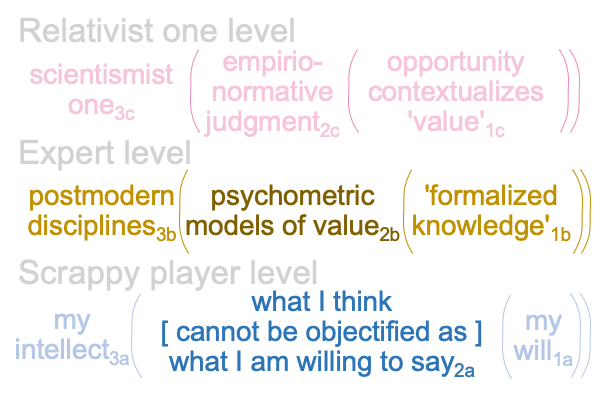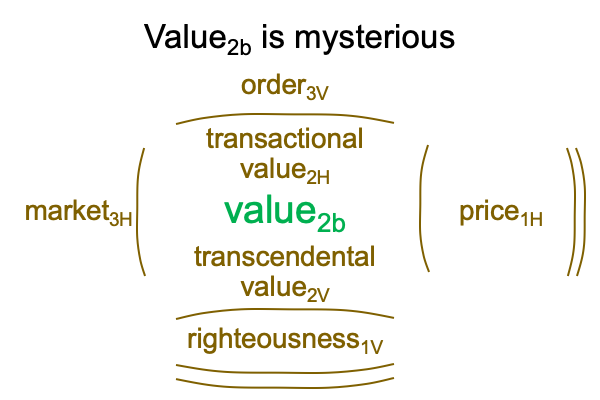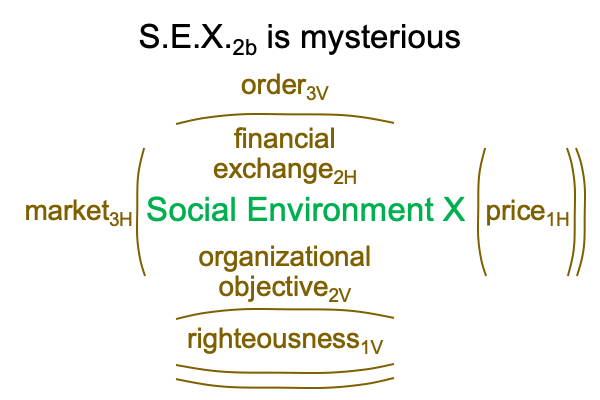0416 Chapter five discusses one particular scientismist3c arranged marriage between capitalism and socialism2b.
0417 Perhaps, this is a good time to review where the psychometric sciences appear in the interscope for the post-truth condition.

0418 The psychometric sciences2b express the operations of a suite of disciplines ranging from economics (corresponding to capitalist expertise) to social work (corresponding socialist expertise). Associated degrees include accounting and administration, journalism and public relations, marketing and education, and so on.
0419 The psychometric sciences2b are contextualized by specialized languages within each discipline3b, often at variance with one another, so that translating from, say, marketing to administration is not an easy task. Nevertheless, all specialized languages are formatted in the style of science. Also, all ultimately apply to a single actuality, called “value2b“.
Specialized languages3b are necessary to formalize knowledge1b. Knowledge basically takes what people say2a and turns it2a into observations and measurements1b that have the potential1b of being used as data for psychometric models2b. Psychometric models2b arrive at value2b, as the intersection of transactional value2H and transcendental value2V, roughly corresponding to financial exhange2H and organizational objective2V.
0420 The psychometric sciences wrestle with two intersecting nested forms.
Here is a diagram.

0421 On the horizontal axis, the normal context of market3H brings the actuality of transactional value2H (financial exchange2H) into relation with the potential of price1H.
On the vertical axis, the normal context of order3V brings the actuality of transcendental value2V (social value2V or objectorg2V) into relation with the potential of righteousness1V.
Value2b is the single actuality composed of transactional value2H and transcendental value2V.
The contradictions inherent in value2b can never be resolved, because that is the nature of intersections.
0422 What about the single actuality that Ramaswamy discusses in chapter five?
It is labeled “ESG”.
Environment. Social. Governance.
0423 Allow me to offer a humorous substitute: Social, Environment and X.
“S” stands for “social”, and refers to stakeholders interested in accommodating righteousness at the expense of um… the market.
“E” stands for “environment”, and refers to the elevated prices demanded by stakeholders interested in producing environmental products and services than must be mandated by government fiat on the basis of um… righteousness.
“G” stands for “governance”, which means substantial infiltration of corporations by experts certified in the modeling of transactional and transcendental values. But, that letter changes to “X” as “the thing that Twitter must never become”.
0424 Here is a picture of the mystery of S.E.X.

0425 Before S.E.X., there is S.E.G., the single actuality2b endorsing Twitter’s censorship… or shadow banning… or deplatforming of opponents of woke-ism on the basis of transcendental values2V (involving the normal context of order3Vand the potential of righteousness1V). These socialist policies weigh down Twitter’s transactional value2V (involving the normal context of market3H and the potential of price1H) and attract the curiosity of capitalist investors, who might have an inclination to turn Twitter into the thing that it must never become.
Yes, the curiosity smells like Musk.
0426 This personification of curiosity ends up purchasing Twitter and changing its name to “X”, which is precisely what Twitter must never become, because that turns the acronym, S.E.G. into S.E.X., where X stands for a lack of governance by woke experts, rather than what everyone thinks that “X” might stand for but are unwilling to say.
As such, “X” stands for an eclipse of observations1b of the phenomena of what people say2a and a crucial failure of the psychometric sciences2b. Experts can observe and measure phenomena of what people say about S.E.G. But, no one is able to talk about S.E.X. in a way that that does not objectify what they think. It seems that when one talks about S.E.X., objectification cannot be avoided. Ask Jacques Lacan.
0427 What one thinks [cannot be objectified as] what one is willing to say2a follows the logic of science. What one thinksis like a noumenon. What one is willing to say may be regarded as its phenomena. And, according to the modern Positivist’s judgment, a noumenon [cannot be objectified as] its phenomena.
The exception is when a model is placed over the noumenon, so that one can no longer recognize the noumenon as the thing itself. Then, the model… er… apparent noumenon [can be objectified as] its phenomena.
Unfortunately, no one wants to touch that objectification when it comes to S.E.X.
At least, not without gloves.
0428 This explains the disconnect between the expert models2b and what people think2b when it comes to S.E.X.
For the psychometric sciences, S.E.X. becomes possible when a surplus of righteousness produces a deficit in price.
For what most people think, S.E.X. becomes readily available when a deficit in righteousness produces a deficit in price.
